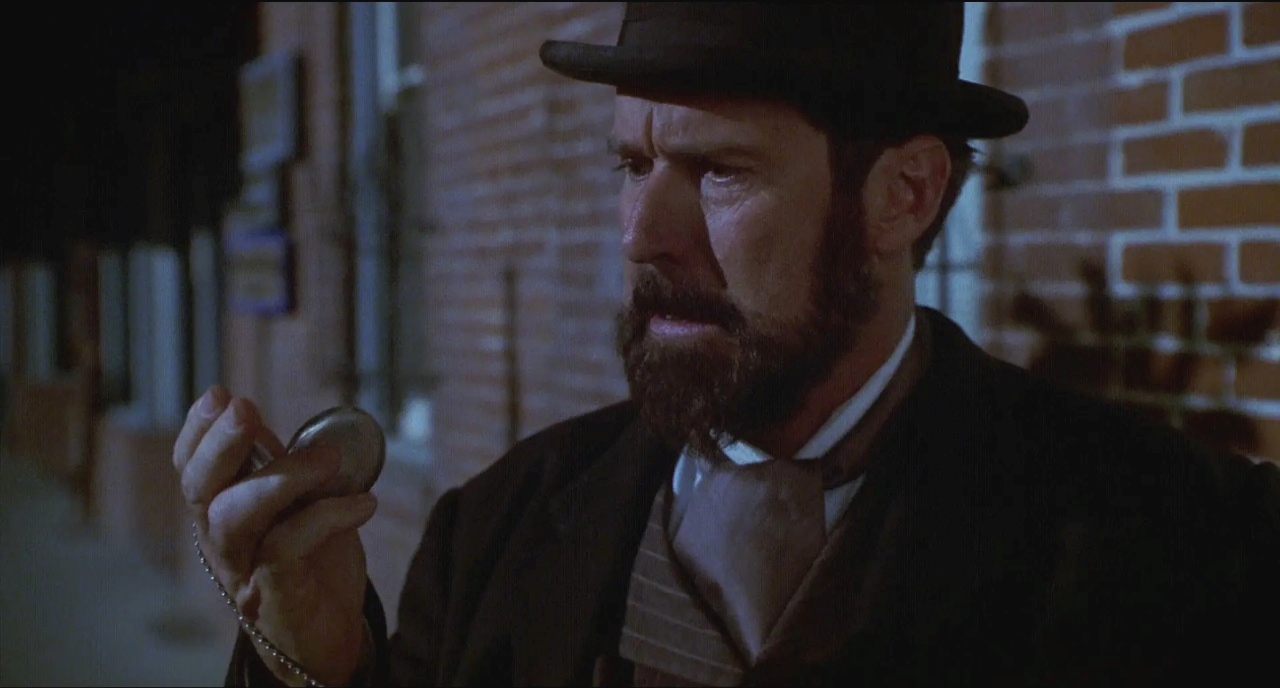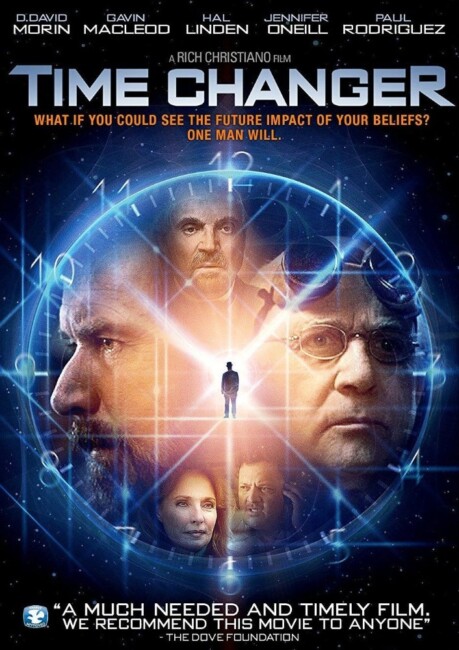Crew
Director/Screenplay – Rich Christiano, Producers – Rich Christiano & Kevin Downes, Photography – Philip Hurn, Music – Jasper Randall, Visual Effects Supervisor – Phillip Moses, Production Design – Laird Pulver. Production Company – Five & Two Pictures/Christiano Film Group.
Cast
D. David Morin (Professor David Carlisle), Gavin MacLeod (Professor Norris Anderson), Paul Rodriguez (Eddie Martinez), Hal Linden (The Dean), Jennifer O’Neill (Michelle Bain), John Valdatero (Tom), Dan Campbell (Rex), Richard Riehle (Dr Wiseman), Paul Napier (Dr Butler), Charles Hutchins (Dr Henry)
Plot
The year 1890. David Carlisle is a professor at Grace Bible Seminary. He is about to publish a book on moral attitudes in society and asks the college to endorse it. However, the endorsement must be a unanimous decision of the board and the only holdout is Norris Anderson. Norris states his decision is based on the fact that David’s set of moral prescriptions do not acknowledge the authority of Jesus Christ. He asks David to come to his house. In the hope of changing Norris’s mind before the publisher’s deadline, David reluctantly goes. Norris shows him a time machine that he has invented. He urges the disbelieving David to step inside and be sent into the future to see what has happened. David does and is transported over a hundred years forward into the present-day. There he is bewildered by the modern world and appalled at seeing the lax moral ways that have come to overtake society without the authority of Christ.
Christian cinema has become a niche industry in the 2000s. Beginning largely in the mid-1990s, the genre had its way paved by the modest hit of The Omega Code (1999), which led to a number of other works that have enjoyed a good deal of popularity in recent years, thanks to their employing B-list Hollywood actors to carry them to audiences beyond the church faithful. Some of these such as Fireproof (2008), God’s Not Dead (2014), Heaven is For Real (2014), Miracles from Heaven (2016) and especially Left Behind (2014), which even managed to rope in A-lister Nicolas Cage, have enjoyed reasonable box-office success.
The idea of the Christian movie and good cinema seems to be an oxymoron. Nevertheless, the premise of Time Changer intrigued me – that of a 19th Century Biblical scholar coming forward to the present-day in a time machine and being appalled at the moral collapse of society he sees. It is sort of a variant on Time After Time (1979) or Kate & Leopold (2001), which both featured a Victorian man trying to comically adjust to the 20th Century – but with a religiously-minded spin. It should be noted that Christian cinema had previously ventured into the time travel genre with Split Infinity (1992), although that featured a journey in the opposite direction – a modern girl travelling into the past. On the minus side, the film is made on a definite B budget. The 19th Century scenes are cheaply produced, blandly shot through a gauzy lens and where the film seems under the impression that period dialogue consists of everyone speaking English without the use of contractions.
Unfortunately, Time Changer kills any promise off in its opening scenes, which feature an academic board discussion that gets dragged down into the issue of whether D. David Morin’s book about morality in society should be sanctioned by the university because he ‘doesn’t recognise the authority of Christ.’ To be honest, this is about the point that Time Changer loses any secular audience. Whether Christians are preaching morality and bother to acknowledge ‘the authority of Christ’ every time they do so seems like the kind of legalistic, hair-splitting quibbling that only people seriously wrapped up in theological minutiae could give a toss about. When you consider all the big moral issues that the film could be addressing, this kind of petty concern seems to reduce the film’s argument about moral breakdown in society to ridiculousness. But then I am not a Christian so what do I know?

That said, Time Changer also seems to conflate this lack of acknowledgement with the imminent moral collapse of society. The film seems to think that without mentioning Christ’s name every time morality of any kind is preached, society will fall apart. In other words, what we have seems to be a direct appeal to the idea of religious morality as the foundation of social law – in effect, the obliteration of the dividing line between religion and state. (It should also be pointed out that the only country in the world that seems to exert the kind of religious authority that Rich Christiano seems to advocate is Iran!)
The film gains some amusement out of the scenes with D. David Morin trying to cope with the modern world and making sense of cable tv, the internet, terms like ‘jetlag’, radio headphones, radio-controlled toy cars, intercoms, electrical lamps and being oblivious to tipping (which should hardly be a surprise to him in that it a custom that has been in use in America ever since the country was a British colony). Rich Christiano plays various of these scenes for comedy value – like where D. David Morin encounters Paul Rodriguez in a laundromat and is baffled that he doesn’t go to church to seek fellowship; where he remonstrates two girls he overhears plotting to get booze for their immorality and lack of respect for their elders; becomes outraged in a movie theatre after watching a film in which the Lord’s name is taken in vain; and tries to block a kid from watching a tv on which a couple are seen kissing. In one scene, he becomes outraged in a department store for their having (I think) female undergarments on display (although quite what he is outraged about is hard to tell as the film is so coy it will not even depict the objects of his ire). The film even speaks in favour of the restitution of the Hays Code. Elsewhere, Morin is disapproving of the fact that churches hold social programs for attendees rather than spend all their time evangelising.
What Rich Christiano seemed to be doing (or at least the impression I had when I was watching the film) was playing these scenes for comedy. (It is hard to think that anybody in the modern era would take these outlooks seriously). On the other hand, when we reach the end of the film, these bizarrely antiquated moral issues seem to be the sole reasons that D. David Morin has used to determine that the US is in an imminent state of moral collapse – he even compares modern society to Sodom and Gomorrah or the state of the world before The Flood. I mean of all the moral issues plaguing the USA today – rampant crime, widening rich/poor divide, increasingly usurious practices by corporate bodies, the proliferation of hand guns, international terrorism and so on and so on – Christiano seems to think the biggest issues are people kissing on tv and lingerie on display in department stores. It is hard to believe that someone can take this outlook seriously but, despite the initial comedic playing, the film gives you no other option but to believe that it does take it seriously. With bizarrely antiquated 1950s outlooks like this, it is hard to stop regarding Time Changer as a ridiculously bad movie.
Time Changer was the third film directed by Rich Christiano. Christiano has also made a number of other films all on Christian themes, including Second Glance (1992), End of the Harvest (1998), Unidentified (2006), which offered the novelty of being a Christian UFO movie, The Secrets of Jonathan Sperry (2008) and A Matter of Faith (2014), as well as produced several others.
(Winner Worst Film in this site’s Worst Films of 2002 list).


